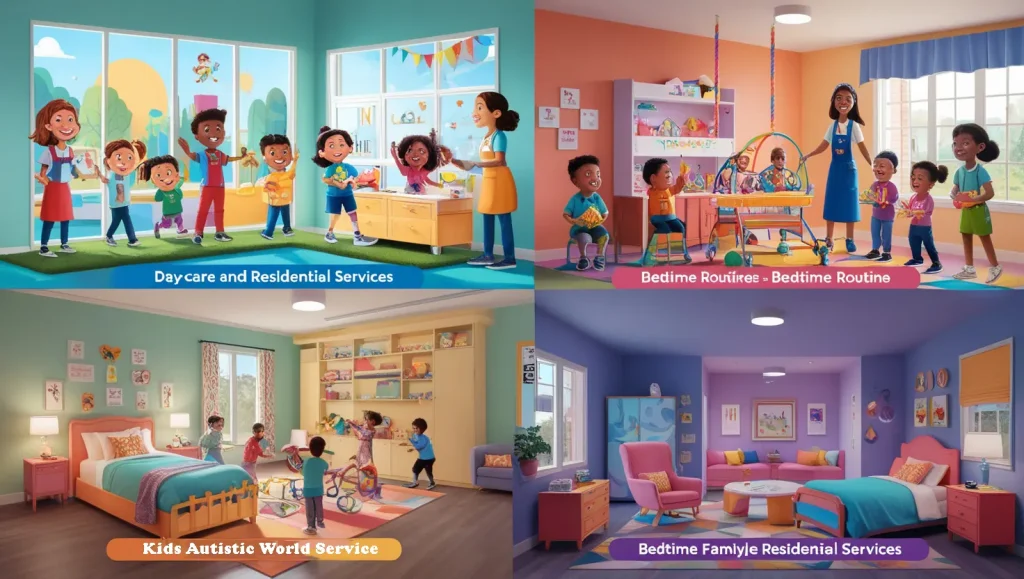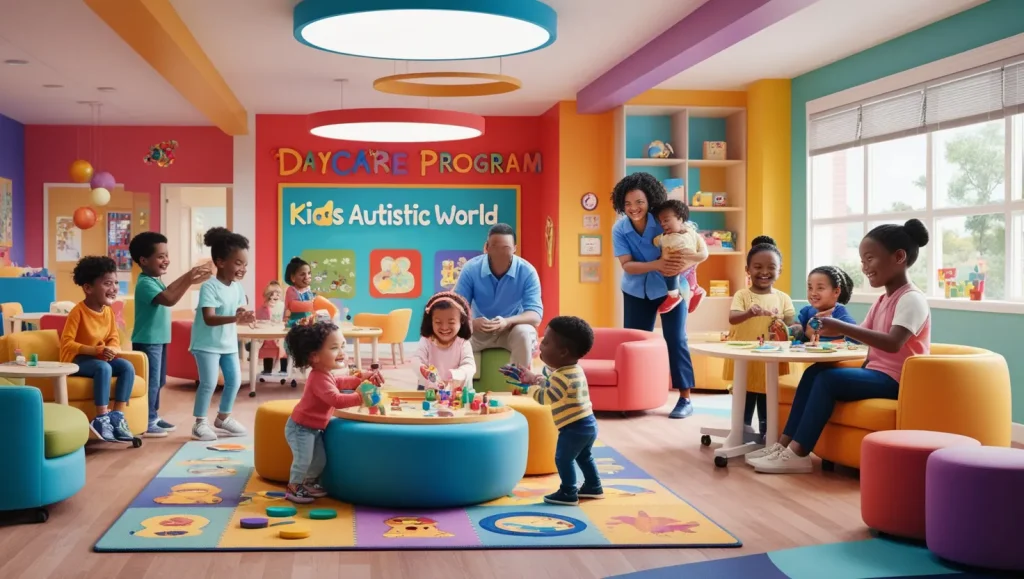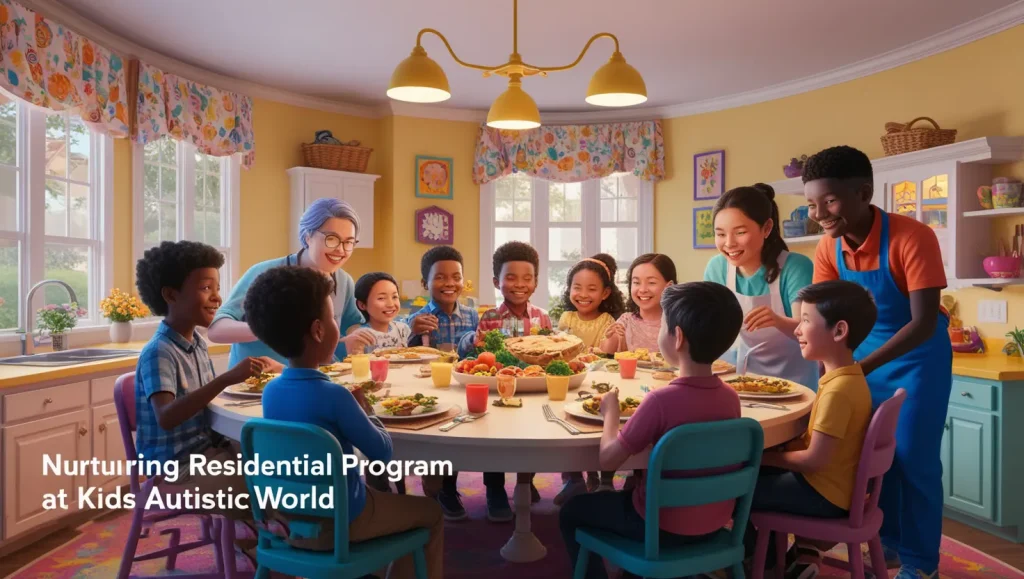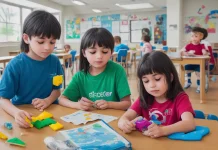
Day-Care and Residential Service
Kids Autistic World recognizes the importance of providing comprehensive support for children with autism and their families. One of the key services offered by the organization is a specialized day-care and residential program designed to meet the unique needs of children with autism in a safe, nurturing environment. These services not only offer personalized care but also create a space for children to grow, develop, and thrive.
Personalized Care in a Safe and Nurturing Environment
The day-care and residential programs at Kids Autistic World are tailored to provide each child with the support they need based on their individual requirements. With a team of experienced caregivers, therapists, and educators, the organization ensures that each child receives a combination of therapeutic activities, educational support, and emotional guidance.
The day-care program is structured to provide children with a balance of learning and play. Activities are designed to enhance communication skills, social interactions, and cognitive abilities, while also helping children navigate their emotions and sensory experiences. This safe space allows children to feel supported as they work toward achieving their goals.
For children who require more extensive care or whose families need additional support, the residential program provides a home-like setting that prioritizes comfort, safety, and specialized care. These programs are ideal for families who may not have the resources or ability to offer constant support at home.
Educational and Developmental Programs
Both the day-care and residential services focus on delivering individualized educational plans that cater to the child’s learning style and needs. The curriculum includes a combination of social skills training, speech and language therapy, sensory activities, and behavioral interventions—all aimed at helping children with autism develop important life skills.
The residential program also provides children with the opportunity to participate in daily living activities that promote independence. Caregivers and staff members work closely with each child to develop routines that foster self-sufficiency, including tasks such as feeding, dressing, and personal hygiene.
Family Support and Guidance
Day-care and residential services are not just focused on the children but also on their families. Kids Autistic World understands the challenges parents face when caring for a child with autism, and thus offers ongoing support and guidance to ensure that the entire family thrives.
Parents and caregivers are encouraged to participate in regular meetings and workshops that offer practical advice on how to support their child’s development at home. These sessions also provide an opportunity for families to share experiences, gain insights, and connect with others in similar situations.
A Collaborative Approach to Care
The success of the day-care and residential services at Kids Autistic World is attributed to the collaborative efforts of the organization’s multidisciplinary team. From special education teachers and therapists to caregivers and administrators, everyone works together to provide the highest quality of care and education for the children.
The close collaboration between the leadership team and the support staff ensures that children’s individual needs are met, and every child has the opportunity to succeed in a structured and compassionate environment.
Building a Path to Independence
One of the long-term goals of Kids Autistic World’s day-care and residential programs is to empower children with autism to lead as independent lives as possible. Through consistent and targeted support, children are gradually equipped with the skills they need to navigate the world around them with confidence. Whether it’s improving communication, building social relationships, or gaining essential life skills, these programs aim to give children the tools they need to flourish.
Conclusion
Kids Autistic World’s day-care and residential services provide a holistic, child-centered approach that combines education, therapy, family support, and community building. Through personalized care and attention, children with autism have the opportunity to grow, learn, and develop in a safe and supportive environment. The program’s focus on individualized goals, social and emotional growth, and family involvement ensures that both children and their families feel supported throughout their journey.
With its comprehensive services and dedicated team, Kids Autistic World is not just helping children with autism today, but also building the foundation for a brighter, more inclusive future.

Day-Care Program
What is the Day-Care Program?
Our Day-Care program is an integral part of the services offered at Kids Autistic World. It is designed to provide a safe and structured environment for children during the day, where they can engage in educational activities, receive therapeutic support, and socialize with their peers.
Key Features of the Day-Care Program
Individualized Learning Plans: Each child in the Day-Care program is provided with a personalized care and learning plan. These plans are tailored to meet the child’s developmental needs, focusing on areas such as cognitive, motor, social, and emotional growth.
Therapeutic Support: We integrate therapy into the daily routine, including speech therapy, occupational therapy, and physical therapy. This ensures that children continue their developmental progress in a natural, supportive environment.
Socialization Opportunities: The Day-Care program allows children to interact with peers, fostering the development of important social skills such as sharing, turn-taking, and emotional regulation.
Engaging Activities: Activities are designed to be fun, educational, and developmentally appropriate, including arts and crafts, games, sensory play, and group exercises. These activities help promote creativity, critical thinking, and problem-solving skills.
High Staff-to-Child Ratio: To ensure that each child receives the attention they need, we maintain a low child-to-staff ratio. This helps create a more personalized experience for every child in the program.
Why Choose Day-Care at Kids Autistic World?
Our Day-Care services are ideal for families looking for a supportive, therapeutic, and structured environment for their child. Whether your child is diagnosed with autism, Down syndrome, or other developmental conditions, our Day-Care program provides a safe place where they can thrive.
Benefits of Our Day-Care Program
Comprehensive Development: The Day-Care program is designed to promote all aspects of a child’s development, including physical, emotional, cognitive, and social growth.
Consistency and Structure: Children with autism and other developmental challenges thrive in structured environments. Our program provides a predictable routine that helps children feel secure and engaged.
Support for Families: We offer ongoing communication with families, providing regular updates on their child’s progress and any changes to their care plan.
Day Care Routines
Day Care Routines at Kids Autistic World
At Kids Autistic World, we understand the importance of consistency, structure, and nurturing care in the development of children with autism, Down syndrome, and other developmental challenges. Our Day Care program is designed with a thoughtful and personalized approach to ensure that every child receives the support and attention they need to thrive. Below is an overview of our typical day care routines, which focus on fostering growth in cognitive, emotional, social, and physical areas.
Why Routines Matter for Children with Autism and Developmental Challenges
For children with autism and developmental delays, routines play a vital role in creating a sense of security and predictability. A structured day helps children manage transitions, reduce anxiety, and build confidence. The routines at Kids Autistic World are designed to be flexible enough to accommodate the unique needs of each child while maintaining consistency across the day.
Morning Routine: Starting the Day with Calm and Focus
Our morning routine is designed to help children feel secure and ready for the day ahead. Children arrive at the day care in the morning and are greeted by a familiar face, ensuring they start their day with a sense of comfort.
Key Elements of the Morning Routine
- Welcome and Arrival: As each child arrives, they are greeted by staff, helping them transition from home to the day care environment in a calm and comforting way.
- Morning Circle: The children gather in a group for a brief morning circle. This is an opportunity for staff to go over the day’s schedule, introduce themes or activities, and allow children to settle in. For children with autism, visual schedules or cues are often used to help them understand what to expect.
- Individualized Attention: After the morning circle, children begin their activities based on their individual care plans. Some children may participate in therapy sessions, while others engage in self-directed activities like sensory play or group interaction.
Mid-Morning: Learning, Play, and Therapy
By mid-morning, the children are well into their day, and the routine focuses on engaging them in structured learning and therapeutic activities. At Kids Autistic World, we integrate therapy into daily routines to ensure that every child has access to support during play and learning activities.
Key Elements of the Mid-Morning Routine
- Therapy Sessions: Depending on each child’s needs, they may participate in speech, occupational, or physical therapy sessions during this time. These therapies are customized to address specific goals like improving communication skills, motor skills, or social interactions.
- Learning Activities: Children are given a range of learning opportunities designed to develop cognitive skills. Activities may include reading, puzzles, arts and crafts, or interactive games. For children with Down syndrome or autism, the focus may be on building language skills, sensory integration, or fine motor development.
- Sensory Play: Sensory play is an important part of the routine, offering children a chance to explore textures, sounds, colors, and shapes. These activities are especially beneficial for children with sensory processing challenges.
Lunch and Rest Time: Nutrition and Relaxation
Lunch and rest time are vital components of the day care routine. We understand that children with developmental challenges may have specific dietary needs, so meals are planned accordingly.
Key Elements of Lunch and Rest Time
- Meal Time: Children are encouraged to eat in a calm, social environment. We offer nutritious meals that cater to individual dietary requirements, such as gluten-free, dairy-free, or other specialized diets for children with sensory sensitivities or allergies.
- Rest and Relaxation: After lunch, children have time to rest. This may involve quiet time for individual relaxation or nap time for younger children. Rest is important for recharging energy and allowing children to process the day’s activities.
Afternoon Routine: Socialization, Free Play, and Continued Therapy
The afternoon is focused on reinforcing the lessons of the day through free play, socialization, and continued therapeutic support. It’s also a time for children to interact with their peers in a more relaxed setting.
Key Elements of the Afternoon Routine
- Social Skills Activities: Social interaction is encouraged through group activities and structured play. Children participate in cooperative games, group discussions, or role-playing activities that promote empathy, sharing, and communication.
- Free Play and Exploration: Free play allows children to explore toys, books, and other materials in a less structured environment. This time gives children the freedom to express themselves creatively and build independence.
- Therapy Reinforcement: Additional therapy sessions or activities may be incorporated into the afternoon to reinforce learning objectives. For example, children might practice communication skills in social settings or work on motor skills through physical play.
End-of-Day Routine: Transitioning to Home
As the day winds down, our end-of-day routine helps children prepare to transition home while maintaining a sense of calm and closure.
Key Elements of the End-of-Day Routine
- Wrap-Up and Reflection: The day ends with a wrap-up session where staff and children reflect on the day’s activities. This may involve discussing what each child enjoyed the most or sharing any accomplishments.
- Goodbye and Transition Home: Children are given ample time to gather their belongings and say goodbye to their friends and caregivers. This helps reduce separation anxiety and prepares children for their transition back to their families.
- Communication with Families: Parents or guardians are provided with updates about their child’s day, including any observations on progress, behavior, or new developments. This helps parents stay informed and involved in their child’s care.
Benefits of a Structured Day Care Routine
- Security and Stability: Children with autism or developmental challenges thrive in structured environments. A predictable routine helps them feel safe and secure, reducing anxiety and improving their ability to engage in activities.
- Developmental Progress: By integrating therapy and learning activities throughout the day, children are given continuous opportunities to develop new skills and reinforce what they’ve already learned.
- Socialization Skills: Our day care routine encourages socialization, helping children develop key social skills such as cooperation, turn-taking, and conflict resolution. These skills are essential for forming positive relationships and building emotional intelligence.
- Family Engagement: Through regular communication with families, we ensure that parents are involved in their child’s development and can reinforce the routines and skills learned at day care at home.
Conclusion: The Power of Routine in Child Development
At Kids Autistic World, we believe that a consistent and supportive routine is essential for the development of children with autism, Down syndrome, and other developmental challenges. Our day care routines are carefully designed to provide children with a structured, safe, and nurturing environment where they can thrive. By incorporating therapy, learning, socialization, and rest into a balanced day, we ensure that children are equipped with the tools they need to succeed in life.
Frequently Asked Questions (FAQs)
- How do you accommodate children with different developmental needs in the Day-Care routine?
Each child receives an individualized care plan that is tailored to their specific needs, whether they require speech therapy, sensory play, or extra socialization support. - Is there flexibility in the Day-Care routine for children who may need extra support?
Yes! While our routine is structured, we are flexible in providing additional support and adjusting activities to ensure each child’s comfort and engagement. - How do you manage transitions between activities during the Day-Care routine?
Transitions are managed with visual cues, verbal prompts, and consistent routines to help children feel prepared and reduce stress. - What if my child doesn’t feel comfortable during a specific activity in the routine?
Our staff is trained to adapt activities to meet your child’s comfort level and help them ease into new experiences. We always prioritize the child’s well-being and progress. - How can I stay involved in my child’s Day-Care routine?
We encourage regular communication with parents and provide daily updates on your child’s activities, progress, and any observations, ensuring you’re fully engaged in their development.

Residential Services
For families that need more intensive, round-the-clock care, our Residential Services provide a supportive home-like environment for children with autism and other developmental conditions. This program is designed for children who need continuous supervision and therapeutic care beyond what is offered in a typical day-care setting.
Key Features of the Residential Program
- 24/7 Supervision and Care: Our residential facility offers around-the-clock care, ensuring that children are supported and safe at all times. This is ideal for children with higher care needs who may require constant supervision or therapeutic intervention.
- Individualized Care Plans: Similar to our Day-Care program, each child in the residential program receives a personalized care plan. The care plan is based on the child’s unique developmental needs and is designed to promote growth in all areas of life.
- Therapeutic Services On-Site: All children in our residential program have access to therapy services, including speech, occupational, and physical therapy. These services are integrated into the daily routine to support the child’s development and progress.
- Socialization and Recreational Activities: Children in our residential program are encouraged to engage in social and recreational activities, both with their peers and with staff. These activities help to improve social skills, build friendships, and enhance emotional well-being.
- Family Involvement: While children are receiving care in the residential setting, we believe that family involvement is critical. We maintain open lines of communication with families and encourage regular visits, meetings, and updates on their child’s progress.
Why Choose Residential Services at Kids Autistic World?
Our Residential Services offer a secure, supportive, and enriching environment for children who require continuous care. Whether due to behavioral needs, medical concerns, or the intensity of support required for developmental progress, our residential program provides a home-like setting with access to comprehensive therapy and education.
Benefits of Our Residential Program
- Continuous Care: For children who need 24/7 care, our residential program ensures that their needs are met around the clock, with dedicated staff who are trained to support children with developmental challenges.
- Therapeutic Integration: Therapy services are provided throughout the day to help children make consistent progress in speech, motor skills, and behavior.
- Comfort and Security: Our residential program is designed to feel like a home, with familiar routines, comfortable living spaces, and a supportive atmosphere where children can feel safe.
- Focus on Social Skills and Emotional Well-Being: Socialization and emotional regulation are key components of the residential program, helping children interact with others, understand their emotions, and build resilience.
Comparing Day-Care and Residential Services
Both our Day-Care and Residential services offer individualized care and developmental support for children with autism, Down syndrome, and other developmental conditions. However, there are distinct differences between the two programs, each suited to different family needs.
Feature | Day-Care Services | Residential Services |
Care Schedule | Daytime care only (typically 8-10 hours) | 24/7 care and supervision |
Ideal for | Families seeking structured daytime care | Families needing continuous care and supervision |
Therapeutic Support | Integrated therapy throughout the day | Continuous access to therapy services |
Socialization | Opportunities to interact with peers during the day | Structured social and recreational activities throughout the day |
Staff-to-Child Ratio | Low child-to-staff ratio for personalized attention | Highly individualized care with one-on-one support |
Family Communication | Regular updates and communication with families | Ongoing communication with families and regular progress updates |
How to Enroll in Day-Care or Residential Services
Enrolling your child in the Day-Care or Residential program at Kids Autistic World is simple. Start by scheduling a consultation with our team. During this meeting, we’ll learn about your child’s unique needs, preferences, and family situation, and recommend the best program for them. Our team will guide you through the process of enrollment, including all necessary documentation and assessments.
Conclusion
At Kids Autistic World, our Day-Care and Residential services provide essential support for children with autism, Down syndrome, and other developmental challenges. Whether you choose the structured, daytime care offered by our Day-Care program or the comprehensive, 24/7 care provided by our Residential services, you can rest assured that your child will receive the highest level of care and attention. Our goal is to foster an environment where children can grow, learn, and thrive while providing families with the support they need to navigate the challenges of caregiving.
Residential Routines
Residential Routines at Kids Autistic World
At Kids Autistic World, we offer a supportive and nurturing residential program that focuses on the individual needs of children with autism, Down syndrome, and other developmental challenges. The residential routine is designed to provide structure, consistency, and comfort while also allowing children to develop essential life skills in a safe and supervised environment. Below is an overview of the typical residential routine, which emphasizes skill-building, therapy, socialization, and relaxation.
Why Residential Routines are Important for Children with Autism and Developmental Challenges
Children with autism or developmental delays often thrive in environments that are structured and predictable. A routine in a residential setting provides not only safety and comfort but also an opportunity for children to learn essential skills and routines that prepare them for life outside the residential home. At Kids Autistic World, we ensure that each child’s routine is personalized to address their specific developmental goals while maintaining a sense of stability and security.
Morning Routine: Starting the Day with Comfort and Structure
The morning routine in our residential program is designed to start the day calmly and efficiently, ensuring that children feel grounded and prepared for the activities ahead.
Key Elements of the Morning Routine
- Wake-Up and Transition: Each child’s day begins with a gentle wake-up process, where staff assist children in transitioning from sleep to wakefulness. Visual schedules, soft music, and calming lights may be used to help ease this transition for children who are sensitive to changes.
- Morning Hygiene: After waking up, children follow a structured hygiene routine, including brushing teeth, washing hands, and getting dressed. Staff assist as needed to ensure that each child can manage their personal care tasks as independently as possible.
- Breakfast and Group Gathering: Breakfast is served in a calm and social setting where children can enjoy nutritious meals that meet their dietary needs. After breakfast, children gather for a morning group session, where they can review the day’s schedule, set personal goals, and participate in discussions.
- Individualized Focus Time: Following the group session, children engage in one-on-one or small group activities that are tailored to their specific developmental needs. This could include therapy sessions, educational tasks, or sensory activities.
Mid-Morning: Learning, Therapy, and Skill-Building
Mid-morning is a time when children are actively engaged in structured learning activities that focus on skill-building and therapeutic interventions.
Key Elements of the Mid-Morning Routine
- Therapeutic Support: Children may participate in various therapeutic activities such as speech therapy, occupational therapy, and physical therapy. These sessions are designed to address specific goals related to communication, motor skills, and social functioning.
- Learning Activities: Educational tasks are an essential part of the residential routine. Children engage in activities that support their cognitive development, such as reading, writing, or practicing new skills. Special emphasis is placed on individualized learning plans that align with each child’s developmental needs.
- Sensory and Play Activities: Sensory play is integrated into the routine to support children’s sensory needs. These activities help children process sensory information and develop their ability to focus and engage in meaningful play. Activities may include water play, sensory bins, or music and movement exercises.
Lunch and Midday Rest: Nutrition and Recharging
A well-balanced lunch and rest period is essential to help children recharge, maintain energy levels, and prepare for the rest of the day’s activities.
Key Elements of Lunch and Rest Time
- Lunch: Children are provided with a nutritious lunch that meets their dietary needs. Like breakfast, lunch is served in a calm environment to encourage socialization and positive mealtime habits. Staff assist children as needed during mealtime to promote independence.
- Midday Rest: After lunch, children have time to rest or nap. This is an important period for children to recharge and recover from the day’s activities. For some children, rest time may involve listening to calming music or engaging in quiet, independent activities.
Afternoon Routine: Socialization, Free Time, and Continued Learning
The afternoon routine at Kids Autistic World focuses on reinforcing the lessons of the day through socialization, free play, and continued learning.
Key Elements of the Afternoon Routine
- Social Interaction and Group Play: Children are encouraged to participate in group activities that promote socialization, such as collaborative games, art projects, or storytime. These activities help children build important social skills like cooperation, turn-taking, and empathy.
- Therapy Reinforcement: Some children may have additional therapy sessions in the afternoon to reinforce what they have learned in the morning. These could include individual speech therapy sessions or group social skills training.
- Free Play and Exploration: Free play allows children to engage in unstructured activities that support creativity and imagination. This could involve outdoor play, arts and crafts, or sensory exploration. Free play time is a great opportunity for children to unwind and express themselves in a low-pressure environment.
Evening Routine: Relaxation, Dinner, and Transitioning to Bedtime
As the day draws to a close, the evening routine at Kids Autistic World focuses on relaxation and preparing for bedtime.
Key Elements of the Evening Routine
- Dinner: Dinner is served in a relaxed, social environment where children can enjoy a balanced meal. As with other meals, children are encouraged to practice social skills and independence while eating.
- Relaxation and Wind-Down Time: After dinner, children participate in calming activities to help them relax and prepare for bedtime. These activities may include quiet reading, relaxation exercises, or light stretching.
- Bedtime Preparation: Bedtime preparation includes personal care tasks like bathing, brushing teeth, and changing into pajamas. Staff assist children as needed, ensuring that each child can perform these tasks as independently as possible.
- Goodnight Ritual: Children end the day with a calming bedtime routine, which may include listening to soothing music or having a story read to them. This helps children feel secure and ready for rest, promoting a peaceful and restful sleep.
Benefits of a Structured Residential Routine
- Consistency and Stability: For children with developmental challenges, a structured routine provides a sense of security and helps reduce anxiety. The predictability of daily activities builds confidence and allows children to focus on learning and development.
- Skill Development: The residential routine is designed to help children develop key skills across multiple areas, including communication, socialization, self-care, and problem-solving. By providing targeted interventions and activities, children can make measurable progress in their developmental goals.
- Socialization and Peer Interaction: The routine encourages socialization and interaction with peers, promoting emotional intelligence and cooperation. Group activities help children develop the skills they need to navigate relationships and build friendships.
- Individualized Support: Each child’s routine is customized to meet their specific needs and goals. This ensures that children receive the appropriate support in areas where they may need it most, such as therapy, learning, or sensory processing.
Conclusion: Nurturing Growth and Development in a Safe Environment
At Kids Autistic World, our residential routine is designed to create an environment where children can feel safe, supported, and empowered to grow. By providing structure and consistency throughout the day, we ensure that children can develop essential skills, engage in meaningful social interactions, and rest and recharge for the next day. Our dedicated staff works closely with each child to foster their independence, creativity, and confidence, helping them to succeed in every area of their lives.
Frequently Asked Questions (FAQs)
- How do you create individualized routines for each child?
Each child’s routine is based on their unique needs and developmental goals. Our team works closely with parents and therapists to ensure that the routine supports the child’s specific abilities and challenges. - What kind of therapeutic services are included in the residential routine?
We offer a range of therapies, including speech therapy, occupational therapy, physical therapy, and social skills training. These are incorporated into the daily routine to address each child’s specific goals. - How do you handle transitions between activities?
Transitions are managed with visual schedules, verbal prompts, and consistent routines to help children feel prepared and reduce anxiety. We provide support as needed to ensure that transitions are as smooth as possible. - Can children with different developmental needs be accommodated in the same residential setting?
Yes! Our residential program is designed to accommodate a wide range of developmental needs. Each child’s routine is personalized, ensuring that all children receive the support they require in a group setting. - What is the role of family involvement in the residential routine?
We encourage open communication with families and provide regular updates on each child’s progress. Family involvement is crucial for reinforcing skills and routines at home, ensuring continuity of care.















